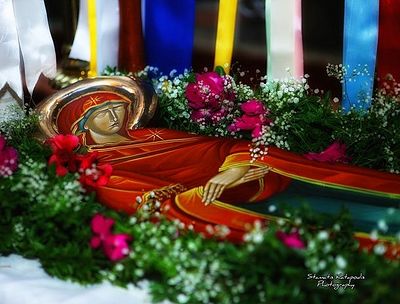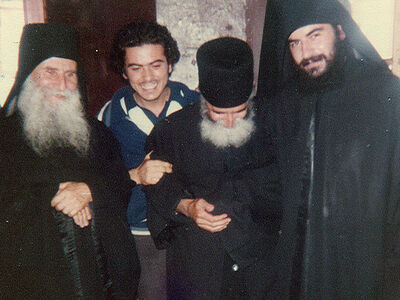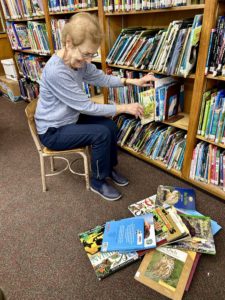 Pain is an Opportunity for Spiritual DevelopmentGrowing up, a man understands that pain is a structural part of his life; no one can avoid it; we will all certainly encounter it. Anxiety and questions arise in the soul of man—many questions.
Pain is an Opportunity for Spiritual DevelopmentGrowing up, a man understands that pain is a structural part of his life; no one can avoid it; we will all certainly encounter it. Anxiety and questions arise in the soul of man—many questions.
“>Part 1

We’re frightened and weak people, living in uncertainty and  Victory Over Fear, and Victory Over DeathDeath can then be transformed for us from a tragedy, horror, or pain into a dormition, a gentle and peaceful sleep, and will be resolved by our awakening into joy, light, and a life in which death will be no more.
Victory Over Fear, and Victory Over DeathDeath can then be transformed for us from a tragedy, horror, or pain into a dormition, a gentle and peaceful sleep, and will be resolved by our awakening into joy, light, and a life in which death will be no more.
“>fear. And if you ask, no one will say: “I want to feel pain!”
No one wants to experience pain. It’s normal, logical, but at the same time, spiritually immature. And if someone wants to spiritually change in his life, he must be realistic, as were the Fathers of the Church. They were realists, not soaring in the clouds. We have to understand that we’re asking the wrong question.
We ask: “Do I want to feel pain or not?”
It’s not about whether I want it or not, whether I like it or not, but that I’m going to experience pain. There is no life without pain. A life without pain is a life that’s dangerous for society. The body experiences pain and thereby informs you that something’s wrong. Your soul experiences pain and tells you: “Stop! You’ve crossed the line, you’ve crossed the limit of what you can endure.”
What is  The Destruction of GriefNo one can ease the grief of a mother, no one can heal it. No one but God.
The Destruction of GriefNo one can ease the grief of a mother, no one can heal it. No one but God.
“>grief? What is stress and all the rest? Pain “rings” the bell; it comes to notify you, to tell you: “Be careful, something’s not right with you.”
A man who doesn’t feel pain is dangerous because he can commit evil. We feel pain, but we also feel the desire for revenge and hatred. Imagine what would happen were there no pain. Pain is a structural element, and we will experience pain.
But the question also isn’t whether we will feel pain, but why it’s worth experiencing pain. The question isn’t whether I’ll experience pain—forget about it, there is no such question—but what is it worth experiencing pain for. What will I suffer for? Why did the saints endure all tortures, torments, and persecutions? Precisely because they answered this fundamental question: “For Whose sake will I experience pain?” And they chose pain for the sake of love for Christ. They gave everything for God’s love; they were ready to suffer for the sake of this love. Of course, they weren’t afraid of pain, because they knew that it’s a reality of life. Therefore, it’s very important for us to soberly understand: What is this value? Who is this person? What meaning do we put into our lives? And why is there meaning in pain?
Who endured in the prisons? Who survived in concentration camps? Who endured during suffering, persecution, genocide, and famine? Those who had  On the Purpose of LifeLet us talk about life. Do you have anyone interesting to talk to about this? If not, then don’t worry as I have very few myself. If you venture to cautiously ask your acquaintances and relatives: “Why do we live on this Earth?” or “What is the purpose of life?” their reaction will be silence or slight confusion.
On the Purpose of LifeLet us talk about life. Do you have anyone interesting to talk to about this? If not, then don’t worry as I have very few myself. If you venture to cautiously ask your acquaintances and relatives: “Why do we live on this Earth?” or “What is the purpose of life?” their reaction will be silence or slight confusion.
“>purpose. According to numerous studies, people in hospitals recover much quicker if they believe in a higher purpose in their life. Those who have meaning and values that they live for… It’s important for us to understand why we’re crucified in our lives.
 When you don’t take risks, when you’re afraid, when you have fear and uncertainty and you want to calculate, define, and control everything, then you’re not living in reality. You become a neurotic and cowardly person. Remember the Parable of the Talents. The man who hid his talent, who hid his charisma, hid from life—he was afraid to live. What do we do? We fear living. We’re afraid to be. We’re afraid of everything. And so, we don’t live, we don’t exist. This fear of not losing anything will not give you a peaceful life in the end. You’ll always have the fear of feeling pain, the fear that there will be difficulties. And the big trouble is that we raise our children the same way. We think the most important thing is to take extra care so they never feel pain and never want for anything. But if a person doesn’t feel a lack of anything, if he doesn’t feel pain, then he won’t be able to learn to withstand pain, difficulties, and trials. We’re helicopter parents. We constantly rush to help our children, and as soon as we see that something’s not working for them, we “fly” into their lives. All so our child won’t feel pain, so he’ll have everything, so he gets everything ready-made. It’s scary.
When you don’t take risks, when you’re afraid, when you have fear and uncertainty and you want to calculate, define, and control everything, then you’re not living in reality. You become a neurotic and cowardly person. Remember the Parable of the Talents. The man who hid his talent, who hid his charisma, hid from life—he was afraid to live. What do we do? We fear living. We’re afraid to be. We’re afraid of everything. And so, we don’t live, we don’t exist. This fear of not losing anything will not give you a peaceful life in the end. You’ll always have the fear of feeling pain, the fear that there will be difficulties. And the big trouble is that we raise our children the same way. We think the most important thing is to take extra care so they never feel pain and never want for anything. But if a person doesn’t feel a lack of anything, if he doesn’t feel pain, then he won’t be able to learn to withstand pain, difficulties, and trials. We’re helicopter parents. We constantly rush to help our children, and as soon as we see that something’s not working for them, we “fly” into their lives. All so our child won’t feel pain, so he’ll have everything, so he gets everything ready-made. It’s scary.
Remember what happened to the young man on Syntagma. I don’t know if you heard about this. There were clashes on Syntagma Square. Anarchists fought with the police, throwing Molotov cocktails. And one mother from the outskirts of Athens saw her son in the crowd. What do you think, what did she do? She left her house and went to Syntagma to bring him a coat, because she saw that her son, who was throwing rocks and Molotov cocktails, didn’t have a coat on. It didn’t bother her that he was throwing rocks and Molotov cocktails—she was worried her son would get sick! You can read this story online.
A man is already thirty, forty, fifty… not to mention someone who’s sixty… You ask him: “Why are you always so gloomy?”
And he responds: “It’s my mother’s fault! My father’s fault! My parents’ fault!”
Well, okay, but you’re an adult already! You’re sixty, and you’re still blaming your mother and father?!
People don’t notice this syndrome, but it’s there. You can’t get away from it.
One time in Crete, I went to a mountain village to hear confessions. Conditions are tough in the mountain villages of Crete. So during Confession, the door opened and in came a six-and-a-half-foot-tall Cretan, with a huge mustache, his shirt unbuttoned, in boots, with chains. He was more than six feet tall, and I’m short. I said to myself: “That’s it, I’m finished. He’s going to kill me. There are only mountains all around us; there aren’t many people in the village. Oh, what’s going to happen?!”
So I asked him: “Did you come to confess?”
“Yes!”
And I thought to myself: “Something’s not right here!”
“Have a seat!”
He sat down, and I asked him: “Is there something you’d like to confess?”
“No!”
“No?”
“No!”
“Then why did you come here?”
“My mama told me to come!”
“Your mother asked you to come see me?””
“Yes,” he said.
I immediately plucked up my courage.
“How old are you?”
“Forty-five.”
“And your mother told you to come here for Confession?”
“Yes.”
“I see. Bow your head, I’ll read the prayer of absolution over you!”
This is how someone can not grow up, not take his life seriously. So he torments himself and others.
So the important thing isn’t whether we’re going to have problems. We’re going to have problems. Let’s put out of our minds the fantasy that somewhere there is the ideal marriage, the ideal life partner, the ideal children. You might say about Crete: “Crete is paradise!”
In Crete we say: “Katerini is paradise!”
In the world they say: “Everything is perfect on Mt. Athos!”
On Mt. Athos they say: “You can labor ascetically in the world, too.”
One time some friends and I went to a monastery. And we told the abbot: “Geronda, your monastery is paradise!”
He told us: “Yes, but Adam and Eve sinned in Paradise!”
It’s important to understand that there’s no point in looking for a trouble-free life, because no such life exists. The question is whether the problems you have will lead you to something, whether your suffering has meaning for you. And this is what gives us spiritual life in Christ—it makes sense of suffering, gives meaning to human pain, leads a man to Christ, to God, to his deep self, to his neighbor, and so on. So pain is an opportunity for human development. Just imagine: Behind the big and radical changes that take place in our lives, there’s always pain; behind charisma there’s a cross; behind achievements there’s human fatigue; behind success there are a thousand failures. For a scientist to succeed and create some kind of product, to come to a scientific conclusion, he endures hundreds of failures, he despairs, he experiences pain, he bangs his head against the wall. An athlete, a winner, achieving successes, gives up a lot. There’s always a trial, with pain. Thus, the pain in our lives helps us develop. It leads us somewhere, and it’s important to choose where we want it to lead us.
Pain is an opportunity to see our values again, no matter how we lived before. Only pain, only a catastrophe will help do this. And therein lies the mystery of God’s silence.
A few days ago, a woman told me: “I’ve been sad and sick for so long; my body hurts and I have no desire to leave the house and talk with anyone.”
She was inconsolable. She also told me: “I pray to God for the Lord to come here, to this closed room, and help me!”
I told her: “He’s not coming!”
And He’s not coming because in reality, she, just like the rest of us, doesn’t look for God when she’s facing some difficulty. We just look for a crutch to lean on, but we don’t look for God Himself. God isn’t coming because the Lord wants you to go through this state, so you change your way of thinking, your outlook on life, your attitude towards life. If He would come, He would “destroy” you. That’s why He’s silent. But it’s not silence, rather it’s His answer. His silence is His way of speaking, to lead you somewhere and continue leading you throughout your life. As they say, the Lord doesn’t bring you a fish, rather He teaches you how to fish. God doesn’t want everything to be handed to you on a silver platter; He wants to teach you, He wants to make you mature, to bring you into a state where you learn the art of life. We need to understand and grasp this in adulthood.
As  “My First Meeting with Elder Paisios”He told me, “You are related to us.” I said to him, “Geronda, are you from Cyprus?” He replied, “You’re slow-witted.”
“My First Meeting with Elder Paisios”He told me, “You are related to us.” I said to him, “Geronda, are you from Cyprus?” He replied, “You’re slow-witted.”
“>St. Paisios said, the Lord will never give you what He has already given. You want God to give you a cup of water when He’s already given you a whole spring. Go head, get yourself some water from the spring. Elder Aimilianos says God has already given us what we need. You want to be happy, and God has given you the chance to be happy: Get to know people—live and be happy. This is what St. Porphyrios spoke about: We should rejoice in everything—in the sea, the mountains, swimming, food, relationships, so everything would be an occasion for life, a cause for rejoicing, a cause for glorification; so the simplest detail would become an occasion for glorification. God has given you this. That’s why St. Paisios says that if you don’t find any water in the desert, then the Lord won’t show you where the spring is—don’t expect it—He won’t show it to you until He sees that you’re striving for it, searching, digging, fighting. He won’t give it to you right away. He wants to see your energy, your desire to work, to see how your life pulsates, to see how you live—this is what He wants from you. He wants you to live, not just be a ghost, a pale shadow.
We have to learn to live with the pain we’ve chosen. That means the joy and happiness in our life is a choice: I choose to be happy. Why do I say this? Because if you’re waiting for everything in your life to become perfect before you start laughing, then you’ll never start laughing. It doesn’t happen that someone has a perfect life without any problems. What are we always saying? We say: “How can everything be good with me, Father, if I’m sick, if I have no money, if my wife is difficult, if my husband is unruly, if I have problems with my children or at work with my co-workers?” But the words “if” and “why” are always present in our lives. You can always find an “if,” “maybe,” or “because,” that destroys the joy in your life; your whole life will pass you by and you’ll never be happy and never enjoy the pleasures of life.
We have to follow our life’s path, although our life isn’t always perfect. Let’s not just stand around waiting for everything to be perfect on our life’s path, because we’re already walking along this path. We want to control and arrange everything, to have ready-made answers to our questions, and then live and have fun. But that will never happen; our whole life will pass, the best moments of our lives will be lost, we’ll destroy our lives. Our life and our daily routine will become a huge cemetery of lost moments, lost days, which the Lord gave us to live and be in a relationship with Him, with ourselves, with people; and we look for an imaginary perfection that doesn’t exist. Beauty is hidden in small things, which, with the grace of God, will become big; it’s hidden in simple things, in everyday life—therein is hidden the essence.
To be continued…


 Pain is an Opportunity for Spiritual DevelopmentGrowing up, a man understands that pain is a structural part of his life; no one can avoid it; we will all certainly encounter it. Anxiety and questions arise in the soul of man—many questions.
Pain is an Opportunity for Spiritual DevelopmentGrowing up, a man understands that pain is a structural part of his life; no one can avoid it; we will all certainly encounter it. Anxiety and questions arise in the soul of man—many questions.
 Victory Over Fear, and Victory Over DeathDeath can then be transformed for us from a tragedy, horror, or pain into a dormition, a gentle and peaceful sleep, and will be resolved by our awakening into joy, light, and a life in which death will be no more.
Victory Over Fear, and Victory Over DeathDeath can then be transformed for us from a tragedy, horror, or pain into a dormition, a gentle and peaceful sleep, and will be resolved by our awakening into joy, light, and a life in which death will be no more. The Destruction of GriefNo one can ease the grief of a mother, no one can heal it. No one but God.
The Destruction of GriefNo one can ease the grief of a mother, no one can heal it. No one but God. On the Purpose of LifeLet us talk about life. Do you have anyone interesting to talk to about this? If not, then don’t worry as I have very few myself. If you venture to cautiously ask your acquaintances and relatives: “Why do we live on this Earth?” or “What is the purpose of life?” their reaction will be silence or slight confusion.
On the Purpose of LifeLet us talk about life. Do you have anyone interesting to talk to about this? If not, then don’t worry as I have very few myself. If you venture to cautiously ask your acquaintances and relatives: “Why do we live on this Earth?” or “What is the purpose of life?” their reaction will be silence or slight confusion.
 “My First Meeting with Elder Paisios”He told me, “You are related to us.” I said to him, “Geronda, are you from Cyprus?” He replied, “You’re slow-witted.”
“My First Meeting with Elder Paisios”He told me, “You are related to us.” I said to him, “Geronda, are you from Cyprus?” He replied, “You’re slow-witted.”
 Ascension of the LordAscension of the Lord
Ascension of the LordAscension of the Lord The Apostle Paul’s “Hymn of Love”There are sixteen properties of love, each worthy of separate analysis, described in this chapter. Let’s consider them from the point of view of psychology, as far as that is permissible in relation to the Holy Apostle Paul’s Epistle.
The Apostle Paul’s “Hymn of Love”There are sixteen properties of love, each worthy of separate analysis, described in this chapter. Let’s consider them from the point of view of psychology, as far as that is permissible in relation to the Holy Apostle Paul’s Epistle.
 Funeral and memorial prayers for victims of Gaza monastery blastThe monastery has been sheltering hundreds since the present conflict began on October 7, but two church halls where they were being housed collapsed when the monastery was hit on Thursday night.
Funeral and memorial prayers for victims of Gaza monastery blastThe monastery has been sheltering hundreds since the present conflict began on October 7, but two church halls where they were being housed collapsed when the monastery was hit on Thursday night.